Exciting Alumni Initiative Helps Fellows Reconnect
|
|
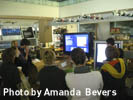 This spring Jessi Quizar, an alumna of the Provincializing Global Urbanism field, walked the streets of Jakarta, Indonesia, looking for new insights into her work. A world away, Tim Prizer, a former fellow in Science/Art Studies, examined glass flowers in an exhibit at the Harvard Museum of Natural History (HMNH). Both activities were made possible by travel grants from DPDF’s new alumni funding initiative, which has sent former fellows to conferences and workshops all over the globe. This spring Jessi Quizar, an alumna of the Provincializing Global Urbanism field, walked the streets of Jakarta, Indonesia, looking for new insights into her work. A world away, Tim Prizer, a former fellow in Science/Art Studies, examined glass flowers in an exhibit at the Harvard Museum of Natural History (HMNH). Both activities were made possible by travel grants from DPDF’s new alumni funding initiative, which has sent former fellows to conferences and workshops all over the globe.
Begun earlier this year, the initiative aims to strengthen alumni’s individual research as well as strengthen the fields through networking opportunities between alumni and senior scholars. DPDF staff created the initiative based on the belief that the professional development of fellows and research directors does not conclude at the end of the fellowship cycle but continues well past DPDF’s final fall workshop, as it did this past spring for two fields.
In March Provincializing Global Urbanism alumni, along with their former research directors, Ananya Roy and Helga Leitner, traveled to Jakarta to participate in the “Urban Revolutions in the Age of Global Urbanism” conference. There they organized a Young Scholars Forum, where they presented their own work to an international audience. The alumni met local scholars and activists who gave them a tour of Jakarta. Quizar, a graduate student in American studies and ethnicity at the University of Southern California, and whose fellowship research focused on urban agriculture in Detroit, remarked that meeting with scholars working on similar questions in Jakarta was one of the most productive aspects of the conference: “While Jakarta, a city that is growing incredibly, is in many ways the polar opposite of Detroit, where I base my own research, it was important for me to think through possible connections between them.”
On the other side of the world, eight Science/Art Studies alumni and their research directors, Peter Galison and Caroline Jones, reconvened in Cambridge, Massachusetts, to take part in a wholly different kind of initiative. Rather than a conference, they had organized a three-day workshop that focused on developing and publishing their own research. Between discussions of “transdisciplinarity” and the state of their own projects, the group went on tours of the MIT Media Lab and the HMNH, where they spoke with researchers and designers and reflected on the role of the museum as a research site. The glass flowers exhibit provoked additional discussion; Prizer, who studies anthropology at the University of North Carolina at Chapel Hill, thought it served as a symbol for the field, “a metaphor for understanding the blurred spaces where art and science transgress the classificatory bounds.”
These two alumni activities are a study of contrasts in methods, format, and location, but they may prove equally beneficial. Participation in conferences and workshops expands alumni’s networks and strengthens existing ones, while also enhancing the quality of research. DPDF will offer additional opportunities through its alumni initiative in the 2012–13 academic year. Student and faculty alumni may treat these fields’ endeavors as examples of what kinds of activities the program is interested in supporting, but they are also encouraged to think broadly about how their fields could benefit from supplemental support.
|
|
The Eurozone Debt Crisis through the DPDF Prism
|
 While politicians and bureaucrats in Greece, Germany, and other European countries struggle to contain the region’s present debt crisis, they also find themselves debating what the long-term effects of the instability may mean for Europe and the globe. DPDF staff spoke recently with current and former fellowship research directors from disparate research fields to better understand the scope of the Eurozone crisis. These discussions brought to light some of the ways in which interdisciplinary modes of inquiry, such as those sponsored by DPDF, can inform and be informed by the ongoing crisis. While politicians and bureaucrats in Greece, Germany, and other European countries struggle to contain the region’s present debt crisis, they also find themselves debating what the long-term effects of the instability may mean for Europe and the globe. DPDF staff spoke recently with current and former fellowship research directors from disparate research fields to better understand the scope of the Eurozone crisis. These discussions brought to light some of the ways in which interdisciplinary modes of inquiry, such as those sponsored by DPDF, can inform and be informed by the ongoing crisis.
Erik Wibbels, associate professor of political science at Duke University and research codirector of the 2007 field The Political Economy of Redistribution, describes what he sees as a close connection between the field and the Eurozone crisis. He remarks that “while most of the academic work on redistribution investigates the individual-level, interpersonal effects of government taxing and spending, a lot of the interesting, real-world political fights are about redistribution between groups,” including ethnic and religious groups and regions within countries. “As today's Euro crisis continues to threaten the stability of the global economy . . . it has become clear that distributive tensions between countries are incredibly important. . . . It is also clear that the kind of analysis we developed in our SSRC group in 2007 is more relevant than ever.”
Tim Bartley, research codirector of the 2012 field Governing Global Production and associate professor of sociology at Indiana University at Bloomington, approaches the situation from a different angle, explaining that “the current Eurozone crisis is a good example of the uneven integration of political and regulatory structures, as compared to financial structures.” Bartley’s fellow research director, Layna Mosley, professor of political science at the University of North Carolina–Chapel Hill, is also concerned about the interaction of political and economic institutions: “We might ask about the conditions under which national governments privilege domestic political demands—resistance to austerity, for instance—over external market pressures. We also might think about how governments’ earlier choices about how to engage global markets affect their room for maneuvering vis-à-vis markets in the midst of a crisis.”
Another issue of concern is the sometimes fragile coexistence of immigrant and native-born populations, which can become even more tenuous in times of financial insecurity, as historical events in Europe and across the globe have shown. Nancy Foner, Distinguished Professor of Sociology at Hunter College and the Graduate Center at the City University of New York, codirected the 2010 field Multiculturalism, Immigration, and Identity in Western Europe and the United States. “A critical question,” she notes, “is how the Eurozone crisis will affect the lives of immigrants and their children, who are a growing part of the population in Europe as well as the United States.” She adds, “How will the crisis affect their ability to be accepted, and successfully make their way, in the workforce and in a wide range of institutions, from schools to government? Could it lead to more return migration? To changing views of the societies where they have come to live?”
Undeniably, the debt crisis is having a ripple effect on geographies beyond Europe and areas of study beyond economics, and understanding its full effects will require work in multiple fields. The Eurozone crisis demonstrates how seemingly unrelated areas of inquiry can touch on different aspects of the same critical event—an important point for the DPDF program, which challenges fellows and alumni to view their topics of interest through an interdisciplinary lens.
|
|
|
Welcome to our inaugural newsletter!
|
The DPDF Faculty Field Competition is open to tenured humanities and social sciences faculty interested in creating or reinvigorating interdisciplinary fields of study through the training of the next generation of researchers. Applications are due online by October 3, 2012.
This year’s sixty student fellows are drawn from forty universities across the United States and France and span twenty disciplines and interdisciplinary areas of study. They will participate in workshops within the research fields of Ecological History, Gender Justice in the Era of Human Rights, Governing Global Production, Mediated Futures: Globalization and Historical Territories, and New Approaches to Transnationalism and Migratory Circulation.
2012 DPDF Spring Workshop for Domestic Fields
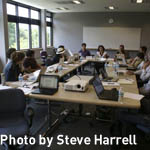 From May 30 through June 3, US-based scholars and students met in bucolic Chaska, Minnesota, for the domestic fields’ spring workshops. Among the fields’ guest speakers were On Barak of Princeton University, who spoke to fellows from Mediated Futures, and Andrew Schrank of the University of New Mexico, who met with fellows from Governing Global Production. Ecological History brought in a panel of scholars to talk about “transdisciplinarity,” including Lauren Urgenson (University of Washington), Amanda Schmidt (Oberlin College), and Harvey Weiss (Yale University). These scholars and fellows will meet again in September in Philadelphia for the second of two training workshops. From May 30 through June 3, US-based scholars and students met in bucolic Chaska, Minnesota, for the domestic fields’ spring workshops. Among the fields’ guest speakers were On Barak of Princeton University, who spoke to fellows from Mediated Futures, and Andrew Schrank of the University of New Mexico, who met with fellows from Governing Global Production. Ecological History brought in a panel of scholars to talk about “transdisciplinarity,” including Lauren Urgenson (University of Washington), Amanda Schmidt (Oberlin College), and Harvey Weiss (Yale University). These scholars and fellows will meet again in September in Philadelphia for the second of two training workshops.
University of Poitiers Hosts 2012 International Field Spring Workshop
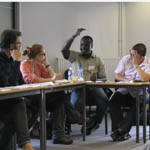 This year’s international research field, New Approaches to Transnational- This year’s international research field, New Approaches to Transnational-
ism and Migratory Circulation, convened at the University of Poitiers in France for its spring workshop, June 10–15. This is DPDF’s third such collaboration with a French institution involving scholars in the US and abroad, and the first with MIGRINTER, a research center of France’s Centre national de la recherche scientifique. A one-day senior scholar conference provided a framework for the subsequent DPDF workshop. The international field will join domestic fields in September for a follow-up training workshop in Philadelphia.
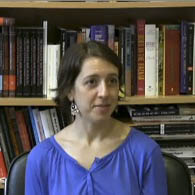 Ever wonder what your fellow alumni have been up to? Find out in our new alumni video series! Rachel Meltzer, a fellow in the 2007 research field The Political Economy of Redistribu- Ever wonder what your fellow alumni have been up to? Find out in our new alumni video series! Rachel Meltzer, a fellow in the 2007 research field The Political Economy of Redistribu-
tion, is featured in our first video. Hear in her own words what her current research entails and how it has been informed by her experiences in the DPDF program. Meltzer is now an assistant professor of urban policy at the New School’s Milano School for International Affairs, Management, and Urban Policy.
|
|
Alumni Profile: Daniel Blocq,
Examining Sudan’s Civil War
|
|
|
|
Former UN military observer and 2009 fellow in State Violence Daniel Blocq has long been interested in the effects of conflict. He grew up in the Netherlands during the eighties, where he became intrigued by his country’s debate concerning civilian resistance to the Nazi occupation during World War II. To what extent did the Dutch resist, collaborate, or remain passive to the Nazis? Questions like this made Blocq curious about what informs the decision making of civilians in times of war. “I was interested not just in the decisions of political leaders but also those of bureaucrats, people in the street, neighbors, fellow Jews, etc.,” Blocq recalls.
Later, as a military observer in Sudan, Blocq drew parallels between the situation in South Sudan and the Netherlands under Nazi occupation, noting that the Dutch had faced problems that in some ways were “very similar to the dilemmas that people caught up in civil war around the world today also need to address.” Surprised at the impact of Sudan’s use of non-state actors in counterinsurgency campaigns, he decided to make this the focus of a doctoral dissertation in the social sciences.
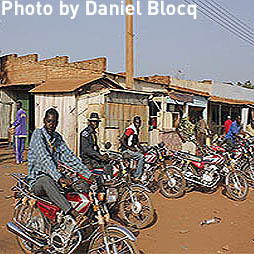
Blocq enrolled at the University of Wisconsin–Madison in 2008 and in 2009 received a DPDF. Despite his extensive experience examining war and violence, Blocq found the conversations he had as a fellow in State Violence crucial to developing the interdisciplinary nature of his project. “The very fact that I am looking at a research question that is at the intersection of different disciplines is a result of the fact that I have been able to communicate with people across disciplines.”
In addition, the summer research supported by Blocq’s fellowship allowed him to further sharpen his research design. “Before the summer, I could hardly imagine identifying a distinct logic to explain variation in state control and support of military proxies.” The other State Violence fellows and the research directors suggested that he think about territorial aspects and encouraged him to keep searching for some coherent logic; three years later, Blocq acknowledges that these suggestions proved to be quite helpful. “After a year of fieldwork, I arrived at some coherent logic and found that the territorial dimension—in this case, a focus on tribal areas—mattered a great deal to my research.”
Blocq’s dissertation now focuses on the variation in resistance to insurgent violence across twenty-four tribal areas in what is now South Sudan. He has recently returned from eight months of fieldwork, funded by an International Dissertation Research Fellowship and a National Science Foundation grant. Though he was forced to leave his sites unexpectedly due to violence in the region, he was able to collect enough data for his dissertation and is currently writing up his findings.
|
|
|
|
PROGRAM CONTACTS
For further information regarding the program and how to apply, please visit our website at www.ssrc.org/programs/dpdf/. Program staff are available at dpdf@ssrc.org to answer additional questions.
|
|
|
|